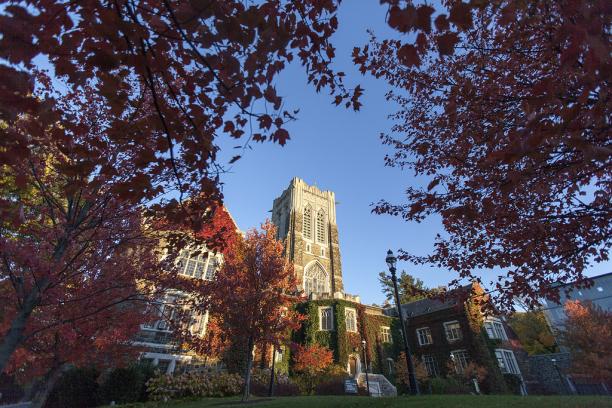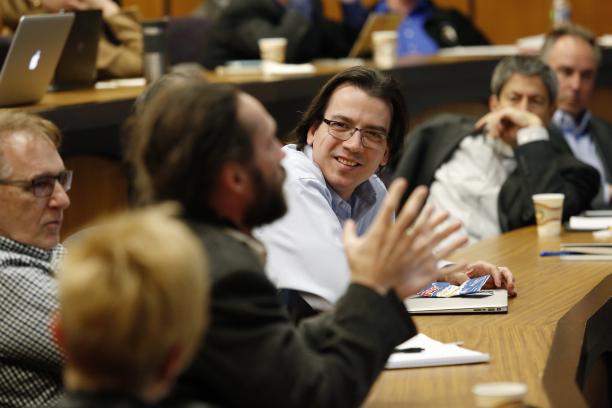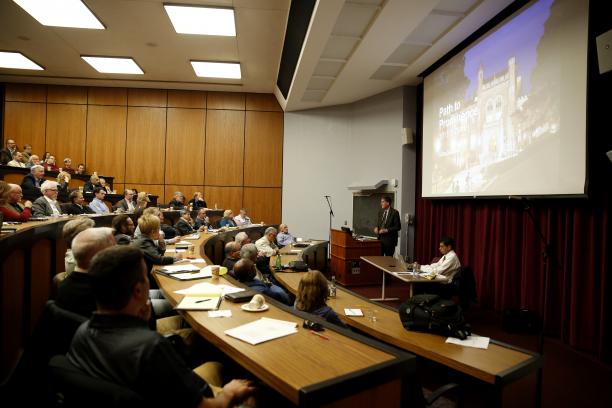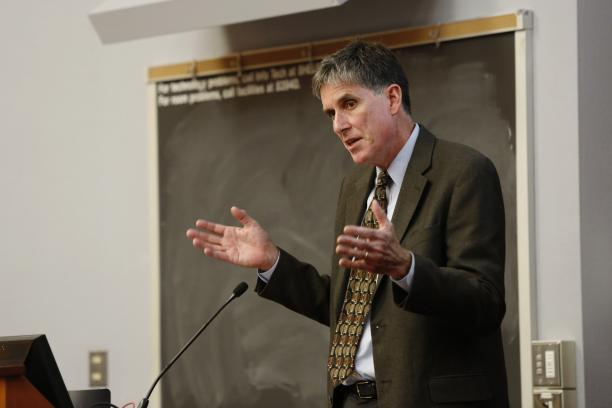For Lehigh, a 'Path to Prominence'

President John Simon has laid out an exciting new plan to take Lehigh forward. The plan, called "Path to Prominence," will see Lehigh grow its undergraduate and graduate student enrollment, hire 100 new faculty, launch a new college of health, and build new facilities as well as renovate existing ones.
Lehigh President John Simon presented a bold academic vision for Lehigh to the university’s Board of Trustees in early October—one that outlined a series of sweeping, decisive steps that will enable Lehigh to build upon its legacy and ultimately stand among the best in higher education for generations to come. The trustees unanimously endorsed the plan laid out by Simon.
“This is an ambitious plan that builds upon our historic strengths and honors the core values that have made Lehigh such a special place,” Simon said after the meeting. “This plan, which we are calling ‘Path to Prominence,’ has the potential to be truly transformative for our university, and I could not have been more encouraged by the positive and enthusiastic response of our trustees.”
Provost Pat Farrell shared details of this new vision for Lehigh with a standing-room-only assemblage at the late October university faculty meeting in Sinclair Auditorium. In an hour-long presentation, Farrell detailed the multifaceted plan, which is an outgrowth of a series of discussions with key constituencies across campus and with alumni and trustees. He outlined the specific ways in which the Lehigh community can begin to work in concert towards the broader goals of the plan.
It includes the following goals:
● An increase in enrollment by 1,000 undergraduate students and 500 to 800 full-time graduate students over a period of seven years. Growing the student population will add to the vitality of the campus and foster a more dynamic community of teaching, learning and research.
● The addition of 100 new faculty, with the aim of recruiting highly respected and ambitious researchers who can further bolster Lehigh’s reputation as a leading research institution.
● The founding and launch of a new college focused on health. This new college, Lehigh’s fifth, will build on core strengths and allow Lehigh to prepare students for success in the thriving and ever-growing health care sector.
● The renovation of the University Center, with the intent of transforming it into a more modern, more beautiful, and more functional space for students.
● The construction of new residential communities to accommodate enrollment growth. Increasing the availability of attractive on-campus housing options will broaden Lehigh’s appeal to potential students and strengthen campus life.
● The construction of a new science and research building on the Packer Campus, as well as important upgrades to research spaces and facilities across campus, including the continued renovations at Mountaintop.
Farrell said the 10-year plan presents a framework that is reliant upon foundational premises that need to be continuously evaluated and refined, and which leave room for development by others—particularly faculty—and also administrative and staff leaders.
To achieve congruity between the university’s vision and its academic-specific objective, Farrell said several steps would need to taken:
● The undergraduate program needs to be broad, with significant depth in a variety of fields. Interdisciplinary perspectives need to be embedded in every major, minor and certificate program; this breadth of programs should create broad opportunities for collaboration; and the embrace of theory-to-practice should be a central part of academic endeavors.
● Professional graduate programs should serve those who aim for a specific profession, not necessarily a career in research. Farrell cited both the MBA program and the Master’s in Technical Entrepreneurship as examples.
● Research and graduate programs need to be broad enough to engage faculty and students in each of the four colleges, yet flexible enough to create unexpected collaborations. Additionally, trained Ph.D. graduates should be able to go onto careers beyond academia.
“Strategic universities concentrate on areas of research strength or opportunity,” Farrell said. “National research prominence is almost never gained in broad fields, but in areas where international and national interest, faculty talent and opportunity overlap.”
Additionally, Farrell said, Lehigh would continue efforts to generally increase diversity across constituencies (undergraduate students, staff and faculty), while at the same time increasing the undergraduate graduation rate to 90 percent or more and attracting a diverse group of talented students from a broader geographic base.
A robust range of undergraduate programs will continue to develop, with a goal of attracting and educating a diverse group of students for career-start and long-term success; being conscientiously and recognizably interdisciplinary in our approach; thoroughly incorporating a global attitude and experience; adopting a more outcomes-focused view; and retaining the ethos of putting theory to use.
“In effect,” he said, “our job is to prepare students for a future we never thought of.”
In the area of research, Farrell said it will be an expectation that all faculty are actively engaged in research and scholarship, and that institutional support will go to areas that are most likely to achieve the overarching goals of knowledge creation, graduate student development and national prominence.
“Many of these will fall between conventional disciplines,” he said. “They may not even be accepted as ‘real research’ for some time. We might want to think a little bit differently about them.”
To fully realize these academic goals, Farrell stressed that full support for students is critical. This could include academic support, advising and physical and mental health efforts. This support will become even more important as the student body becomes more geographically, culturally and ethnically diverse.
The identification of bolder university goals will not remove the focus from several existing, successful programs, such as Mountaintop or Baker Institute programming.
“For many of our students,” Farrell said, “these are signature experiences at Lehigh. If you talk to students, many of them will say that these experiences are what they will remember from Lehigh. And many of them also mentioned that none of their friends at other schools have anything like this. We need to make these available to all students, and incorporate them into the overall assessment of student learning at Lehigh.”
Farrell said he recognizes the potential for discomfort, acknowledging the consequences of a more dynamic institutional environment. Though possibly unsettling, this level of change also presents enormous opportunity, he said.
“You may think, ‘This isn’t what I signed up for,’ but we need to figure out how to move past that,” he said. “We need to set our sights on what we want our future to look like, and where we want to go. This goes beyond any individual sitting in these chairs.
“This is way, way faster than we’re accustomed to here at Lehigh,” he added. “And it will require substantial philanthropy in a way we have not seen at Lehigh. The trustees and the other folks watching us are all pretty excited about what’s possible. I hope you’re excited, too.”
Following the presentation, Farrell fielded a number of questions from faculty related to the identification of health as the subject area for a fifth college, reputational issues on the part of Lehigh peers, and the process for ongoing input as the plan proceeds.
“There are many areas where you can be part of the conversation,” Farrell said. “We will be meeting with deans and there will be opportunities for departments and other groups to be a part of these conversations. And if you want to start, start now.”
Department chairs and unit managers will be encouraged to share the plan with their staff and faculty as the plan proceeds.
Photos by Stephanie Veto
Posted on:







